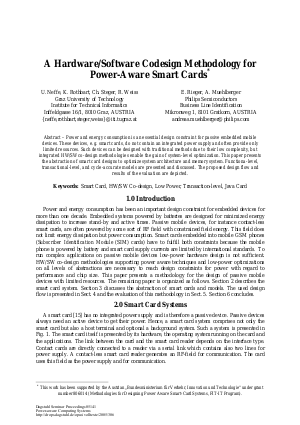Methodologies for Designing Power-Aware Smart Card Systems
Authors Christian Steger, Ulrich Neffe, Klaus Rothbart, Andreas Mühlberger, Edgar Rieger, Reinhold Weiss
-
Part of:
Volume:
Dagstuhl Seminar Proceedings, Volume 5141
Part of: Series: Dagstuhl Seminar Proceedings (DagSemProc) - License:
 Creative Commons Attribution 4.0 International license
Creative Commons Attribution 4.0 International license
- Publication Date: 2005-11-02
File

PDF
DagSemProc.05141.7.pdf
- Filesize: 346 kB
- 12 pages
Document Identifiers
Subject Classification
Keywords
- Smart cards
- power awareness
- HW/SW codesign
- cycle-accurate instruction-set simulator
Metrics
- Access Statistics
-
Total Accesses (updated on a weekly basis)
0PDF Downloads0Metadata Views
Abstract
Smart cards are some of the smallest computing platforms in use today. They have limited resources, but a huge number of functional requirements. The requirement for multi-application cards increases the demand for high performance and security even more, whereas the limits given by size and energy consumption remain constant. We describe new methodologies for designing and implementing entire systems with regard to power awareness and required performance. To make use of this power-saving potential, also the higher layers of the system - the operating system layer and the application domain layer - are required to be designed together with the rest of the system. HW/SW co-design methodologies enable the gain of system-level optimization. The first part presents the abstraction of smart cards to optimize system architecture and memory system. Both functional and transactional-level models are presented and discussed. The proposed design flow and preliminary results of the evaluation are depicted. Another central part of this methodology is a cycle-accurate instruction-set simulator for secure software development. The underlaying energy model is designed to decouple instruction and data dependent energy dissipation, which leads to an independent characterization process and allows stepwise model refinement to increase estimation accuracy. The model has been evaluated for a high-performance smart card CPU and an use-case for secure software is given.
Cite As Get BibTex
Christian Steger, Ulrich Neffe, Klaus Rothbart, Andreas Mühlberger, Edgar Rieger, and Reinhold Weiss. Methodologies for Designing Power-Aware Smart Card Systems. In Power-aware Computing Systems. Dagstuhl Seminar Proceedings, Volume 5141, pp. 1-12, Schloss Dagstuhl – Leibniz-Zentrum für Informatik (2005)
https://doi.org/10.4230/DagSemProc.05141.7
BibTex
@InProceedings{steger_et_al:DagSemProc.05141.7,
author = {Steger, Christian and Neffe, Ulrich and Rothbart, Klaus and M\"{u}hlberger, Andreas and Rieger, Edgar and Weiss, Reinhold},
title = {{Methodologies for Designing Power-Aware Smart Card Systems}},
booktitle = {Power-aware Computing Systems},
pages = {1--12},
series = {Dagstuhl Seminar Proceedings (DagSemProc)},
ISSN = {1862-4405},
year = {2005},
volume = {5141},
editor = {Luca Benini and Ulrich Kremer and Christian W. Probst and Peter Schelkens},
publisher = {Schloss Dagstuhl -- Leibniz-Zentrum f{\"u}r Informatik},
address = {Dagstuhl, Germany},
URL = {https://drops.dagstuhl.de/entities/document/10.4230/DagSemProc.05141.7},
URN = {urn:nbn:de:0030-drops-3067},
doi = {10.4230/DagSemProc.05141.7},
annote = {Keywords: Smart cards, power awareness, HW/SW codesign, cycle-accurate instruction-set simulator}
}
